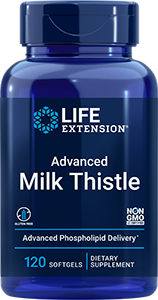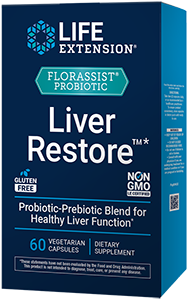
Best Milk Thistle Supplements: How to Choose Them
Published: November 2024
Your liver has the important role of playing master detoxer—cleaning your blood and filtering out all the bad stuff, including things like waste products, alcohol and even old red blood cells. It also produces bile that helps support your digestion.
While it does a remarkable job on its own, like most parts of your body, it can use a little support, especially as you age. One nutrient that the liver loves is milk thistle.
In this blog, we're diving into how exactly milk thistle can support the lasting health of the liver, the benefits of milk thistle, what to look for in a quality supplement and how you should take it.
What is milk thistle?
Before we get into the ins and outs of what this plant does, let's take a closer look at what exactly milk thistle is. Milk thistle is a flowering herb known for its distinctive purple hue and prickly leaves. While milk thistle is native to Europe, it made its way to North America by early colonists and has been historically used to support liver function.
Nowadays, you can find it across the world—including in the eastern United States, California, South America, Asia, Africa, and Australia—and by many names, Marian thistle, holy thistle, Mary thistle, and Scotch thistle are a few among them.
Why is milk thistle good for the liver?
You'll be happy to know that this purple plant isn't only nice to look at. It can be great for your wellness, too!
Using milk thistle can encourage optimal liver function largely thanks to its active ingredient, a mixture of flavonoids from milk thistle seed extract (Silybum marianum) called silymarin. Silymarin is hepatoprotective, meaning it can support and protect the liver against toxins. Common toxins and other factors people can be exposed to include cigarettes, industrial chemicals, airborne contaminants and x-rays.
And if that's not enough to convince you to add this nutrient to your regimen, silymarin is also known for its antioxidant properties, which contributes to other important health benefits. It can inhibit oxidative stress, promote a healthy inflammatory response and support liver cell health.
To put it simply, this pretty plant really packs a punch!
What is the best way to take milk thistle?
There are various formulations of milk thistle, and the one you select might depend on your needs and goals.
You can supplement with silymarin, or you could opt for a supplement that is also standardized to active compounds found in silymarin, such as silibinin (which includes silybins A and B). These are other active components in milk thistle extract that help support overall liver health.
Milk thistle formulas might also be standardized to include ingredients like isosilybins in addition to silymarin and silibinin. These are known to support healthy cell division. Making sure these compounds are in your milk thistle supplement better ensures that you're getting the full spectrum of benefits for your liver health from this herb.
Pro-tip: Because silybin, the main bioactive compound in milk thistle, doesn't dissolve well in water, seek out a supplement that contains a phytosome milk thistle extract so that your body can more effectively absorb and utilize the nutrients.
For advanced liver support, go for a more bioavailable formula that includes phospholipids for additional absorption benefits on top of the compounds we've mentioned.
And as general guidance (and this is true for any supplement), remember to take supplements as directed on their labels, or follow your healthcare provider's guidance. Typically, though, this type of supplement can be taken at any time, day or night, and with or without food. It mostly comes down to personal preference, so do what works for you.
Explore Our Best Liver Health / Detoxification Supplements
How to choose a high-quality milk thistle supplement
Before you add this herb to your daily nutrition, what should you be on the lookout for?
If you're interested in taking milk thistle supplements, beyond checking whether the active compound we've discussed is in the formula, it's also important to confirm that the milk thistle is standardized to those active constituents, so you know you're getting the most out of its benefits. The label should disclose either the dose of the constituent (most likely in milligrams) or the percent that the extract is standardized to.
As a rule of thumb, you want to be mindful of shopping for supplements that include the same dosages as the clinical studies that the formula is inspired by. You also want to seek out companies that provide Certificates of Analysis (COA) for their formulas, so you can confirm what's on the label is in the bottle.
Transparency is vital. You want to be able to see for yourself that a brand's products are as reliable as they claim they are.
Can milk thistle be taken with other supplements?
Yes, it can! People using milk thistle often combine it with other supplements without any issues. So, if you want to combine it with your morning protein shake and vitamin D supplement, for instance, go right ahead!
Of course, checking with your healthcare provider before mixing supplements is always a smart idea.
Can you take milk thistle every day?
Yes. In clinical trials, milk thistle has shown to be well tolerated when taken at the recommended doses. Generally speaking, all of Life Extension's milk thistle supplements (which are gluten-free and non-GMO) are acceptable to take every day, long-term, for liver support.
How else can I support liver health?
Milk thistle is a top pick to support liver function and your general health but remember that supplements are an addition to a healthy lifestyle. This means you want to prioritize eating a nutrient-dense diet with lots of colors, moving your body a little bit every day, getting plenty of sunshine, handling your stress and getting your beauty sleep to keep your liver (and the rest of you!) in tip-top shape.
Your liver does so much for your body. Isn't it time you give it something in return?
Pro tip: Learn about other liver health supplements you might like by taking our quiz.
References
- Barzaghi, N, et al. "Pharmacokinetic studies on IdB 1016, a silybin- phosphatidylcholine complex, in healthy human subjects." Eur J Drug Metab Pharmacokinet. October 1990. https://pubmed.ncbi.nlm.nih.gov/2088770/
- Sharma, Rayna, et al. "Milk thistle." Journal of Primary Health Care. September 2024. https://www.publish.csiro.au/hc/pdf/HC24131
- Zhang, Xiaozhuang, et al. "A review of the botany, phytochemistry, pharmacology, synthetic biology and comprehensive utilization of Silybum marianum." Front Pharmacol. July 2024. https://pubmed.ncbi.nlm.nih.gov/39055491/
- "Milk Thistle." National Center for Complementary and Integrative Health. https://www.nccih.nih.gov/health/milk-thistle
Always be in the know!
Access the latest deals, wellness news, expert health tips & more!










